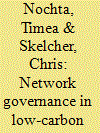| Srl | Item |
| 1 |
ID:
133232


|
|
|
|
|
| Publication |
2014.
|
| Summary/Abstract |
Attitudes to quangos are paradoxical. On the one hand they are perceived to be undemocratic, unaccountable organisations, while on the other they are seen to improve effectiveness, limit political interference and increase public confidence in government. This paradox is reflected in the behaviour of political parties, which generally adopt a harsh line towards quangos in opposition, but come to rely on these bodies in office. Ahead of the 2010 general election it was, however, noticeable that the Conservative party rejected this dynamic by promising to pursue 'a more sophisticated approach'. This article explores the Coalition government's subsequent 'public bodies reform programme', assessing its progress against recommendations contained within the Institute for Government's Read before Burning report of July 2010. It concludes that while the Coalition has addressed long-standing concerns about the day-to-day governance of public bodies, it has failed to resolve a set of broader and strategic (metagovernance) issues.
|
|
|
|
|
|
|
|
|
|
|
|
|
|
|
|
| 2 |
ID:
171504


|
|
|
|
|
| Summary/Abstract |
This article evaluates the opportunities and limitations of network governance to support low-carbon energy transitions in European cities. Network visualization and statistical measures of network structure are combined with qualitative case study data to provide a comparative analysis of energy transition networks in Birmingham, Budapest and Frankfurt. Data reveal that existing networks differ in extent, integration and distribution of authority. Contextual characteristics help explain these differences, highlighting the importance of path dependencies and disjunctions in each city. These findings represent important considerations for the Transition Management model which aims specifically at governing sustainability transitions via network governance. Responding to a gap in the literature we demonstrate that Transition Management must be considered as an intervention into locationally specific settings and existing networks. The design of network structures and processes, as well as role of any ‘transition manager’, must reflect contextual factors and existing network considerations. Failure to account for contextual differences limits the model’s capacity to contribute to sustainable energy transitions in different cities.
|
|
|
|
|
|
|
|
|
|
|
|
|
|
|
|